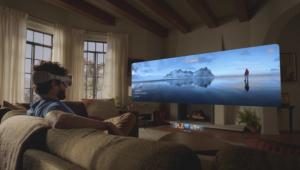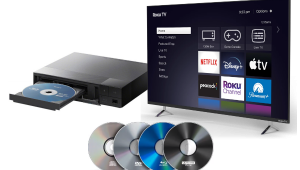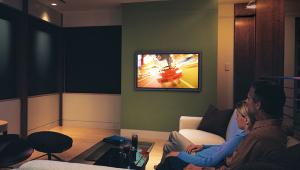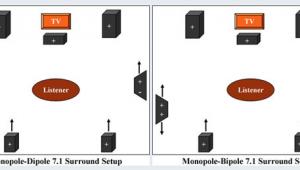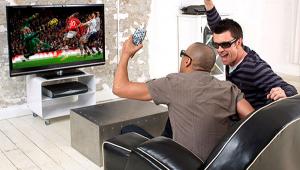I don't ever recall reading about a product on this website that measured well but did not do well in listening tests - perhaps I can be pointed to a review like that?
Primary tabs
Do Audio Measurements Correlate With Sound Quality?

Here at HomeTheater.com, we've certainly observed that poor measurements do not necessarily mean poor subjective performance, and that good measurements do not necessarily reflect good performance. On the other hand, in our experience, measurements sometimes support—and even explain—a reviewer's subjective observations, which are always conducted before the measurements.
Do you think that objective audio measurements using test tones correlate with subjective sound quality playing music? If so, is it a strong or weak correlation? In the comments, I'd love to know how much weight you give the measurements found in our reviews compared with the reviewer's subjective assessment.
Vote to see the results and leave a comment about your choice.
- Log in or register to post comments


As part of my home theater passion, I picked up Floyd Toole's book, "Sound Reproduction: The Acoustics and Psychoacoustics of Loudspeakers". Fantastic book to "Geek Out" on as Scott would probably say. I've also read some other articles by Dr. Toole over the years and here's the basic summary as I would try and recall it. Measurements are important but are not the total, absolute, sum of the parts. Basically, not all speakers that measured ruler flat sounded spectacular, but at the same time, speakers that did not measure well, tended to sound inferior. So, I've tended to hold that philosophy but also let my ears be the judge... because music and audio is inherently subjective.
So, based on reading Floyd's research, I'd tend to assume that yes, there is a correlation--whether weak or strong depends. For example, I tend to prefer speakers with an open baffle (even though I don't own a pair that has it). I love the sense of image, size, and space of Magnepan speakers and I just fell in love with the NOLA Baby Grand speakers with a ribbon tweeter and open back. However, I own Revel.
Finally, I also think that the kind of music you listen to also plays a role. Maggies, for example don't do well (as the stereotype goes) with Home Theater. They just don't play loudly enough. And, some speakers do "better" with classical, others with Rock, others with home theater, others with a wider range, etc.
But I'm putting my foot in the strongly correlated camp... just because I had to make a choice :-)

DO measurements correlate with subjective auditory experience - yes but only if you know which measurement matches which auditory experience. - And the auditory experience also involves a lot of psycho acoustics...
As an example, small variations in level (sometimes below 0.5db) can be sensed, but we hear them as changes in tone, additional detail, improvement/decrease in quality - we do not perceive them as a change in level.
Where we have a measurement that does not correlate at all to the subjective listening experience in any way - it is relevant to ask why we are measuring that parameter!
And on the other side of that coin, where we have a subjective experience and no way of measuring it, it is time to put on our thinking caps and work out a way of measuring it. (which usually first requires understanding how we perceive it... both physically and mentally)
Does the current output of an amp correlate to the subjective listening experience? - Yes, but only if comparing speakers that push that current output vs another set that don't.
More measurements - yes please!
More articles on how the measurements relate to perception - yes please!
More articles on audio perception.... absolutely

I have built my own FL/C/FR speakers for my HT setup. Using new speakers in their encasing I am using Hypex AS2/100 amps that have DSP capabilities. I chose those to be able to tune my speakers for the optimal sound (they are on-wall-in-cabinet designs). After my first setup (measurements as flat as possible) of the filter design I broke in the speakers for a while. With a friend I scheduled a session some weeks after the first setup. The speakers lacked some 'sparkle' and we both felt that the upper midband was a bit subdued. Then we started measuring. Low and behold; there were volume problems at certain frequencies. And yes, mainly in the upper mid and higher frequencies. Changing the settings made the speakers come to life and I have been enjoying their sound ever since.

I would like to see a cross correlation of data between this subject and "how much money do you spend on cables?". I bet it would be interesting.

From both the equipment and room side! I recently had the pleasure of working with Dr. Toole and he has truly put a lifetimes working into better understanding the relationships between what we hear and what we measure.

First, we need to dismiss Floyd Toole's work. Dr Toole has done little to improve the accuracy of sound reproduction. Most of his work has been directed at figuring out what people like and dislike, to improve Canadian manufacturers' market share. And having heard Dr Toole's home system... well, one could raise serious doubts about his "ear". (Both of them, actually.)
About 25 years ago, I rudely insisted to John Atkinson that I move to Santa Fe and focus on researching the relationship between measurements and subjective sound quality. His instant reaction was "No!", just as it is to any and all ideas he did not originate.
As to the issue at hand...
Suppose we did have test signals that were a lot like musical signals. What would this tell us? The answer is... little or nothing, just as conventional test tones tell us little. The reason is that, until you know exactly how the subjective sound of a device differs from absolute neutrality, attempts to correlate "sound" with measurements aren't likely to yield useful information.
Steve Guttenberg is probably unaware that attempts to use music as a test signal have been tried at least twice. About 40 years ago, QUAD performed a classic experiment (which badly needs to be repeated). Using music as the test signal, the input of their 303 amplifier was subtracted from its output. What remained must have been, by definition, distortion. *
If I recall correctly, the "distortion" was down about 60dB, which is quite low. But is it inaudible? Well, it's about 0.1%. By modern standards, that isn't a particularly samll number. (Anyone remember the Leak Point One amplifiers?) And it should be obvious that its audibility will vary with its nature. If it's pure second harmonic, you're not going to hear it. If it's high-order IM, it might very well be audible, because it's uncorrelated with the signal.
Crown did similar research about 25 years ago. A friend who used to be a manager at Crown told me the PL-1 power amp got close to a 90dB null (!!!). Is that low enough to be inaudible? Probably, but who knows for sure?
In short -- you can't look at a distortion number, regardless of how it's derived, and say "It's small, so the distortion must be inaudible."
It's possible to make these determinations, but it would require a lot of research over years (not weeks or months). No one wants to do it, because it would cost too much, and be against the vested interests of both "sides" in this issue.
People are not interested in the truth. All they care about are "facts" that fit their preconceived notions.
* The amplifier's static transfer characteristics (amplitude and phase) had to be applied to the input signal, or it would not have been possible to get a good null.
